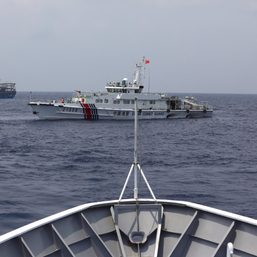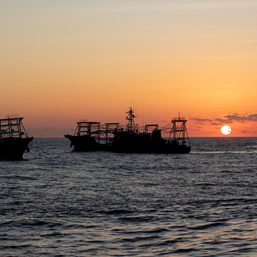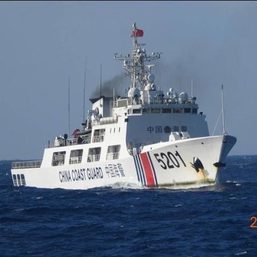SUMMARY
This is AI generated summarization, which may have errors. For context, always refer to the full article.
China has rendered any code of conduct in the South China Sea “dead on arrival” through its passage of a law allowing its Coast Guard to use armed force against anyone found in Beijing-claimed waters, said retired Supreme Court justice Antonio Carpio.
Carpio, who was instrumental in the Philippines’ successful legal case against China’s claim to the West Philippine Sea, said the Coast Guard law is a nail on the coffin of the promised sea code.
“That code is dead, it’s dead on arrival because of this law,” Carpio said on Friday, January 29, in an interview on Seat of Power, Rappler’s podcast about the Philippine presidency.
The Coast Guard law, which China’s National People’s Congress passed last January 22, is proof of Beijing’s “bad faith” in talks with Southeast Asian nations to finalize the COC.
“When China was saying to the ASEAN, ‘Let’s have that code of conduct,’ it was busy preparing this law to kill the code of conduct. This is what is in the mind of China. This new law is the real heart and soul of China,” Carpio told Rappler.
The Philippines has filed a diplomatic protest against China for passing a domestic law that violates international maritime law, a move Carpio supports.
‘Totally useless’ code
China’s new measure renders the COC “totally useless” and “destroyed” any hope that the code could play a role in de-escalating tensions in the South China Sea, added the retired magistrate.
China has fully backed the completion of a code of conduct for all South China Sea claimants, with Premier Li Keqiang even promising to get it done in 2021.
But Carpio is skeptical of the code, even if the deadline is met, saying it could just be part of Beijing’s strategy for dominance in the critical sea lane.
“I’ve always said that code has been dead on arrival a long time ago because China will use that code to legitimize its artificial island building, to legitimize that 9-dash-line. Because China will sign a COC only after they have completed their artificial islands,” said Carpio.
He also said China’s move only proves Duterte’s China policy is a “total dismal, abject failure” since economic gains from Beijing have not materialized as expected whereas the Asian giant has only doubled down on its maritime aggression.
“China has totally duped everybody here by saying that China is on a peaceful rise. This is not a peaceful rise. This is a threat to everyone… This is hegemonic act of China,” said Carpio.
Future of sea code
Philippine President Rodrigo Duterte, meanwhile, has put a lot of faith in the code.
“The President’s declaration is, let’s finish the code of conduct and we hope all claimants in the West Philippine Sea follow the code of conduct,” Presidential Spokesman Harry Roque said on Monday, January 25, when asked about China’s Coast Guard law.
But in November 2020, Duterte expressed some impatience for what he called a “long wait” for the code in a virtual meeting with other Southeast Asian heads of state and their allies, including China and the United States.
Three months before that ASEAN Summit, Philippine Foreign Secretary Teodoro Locsin Jr said he would fight to ensure the Hague ruling is mentioned in the sea code.
The 2016 Hague ruling legally backs the Philippine position that the West Philippine Sea belongs to the Philippines and that China’s claim to it, through its 9-dash-line, is illegal.
In 2020, after years of refraining from gathering international support for the legal victory, Duterte brought up the Hague ruling before the UN General Assembly and declared it cannot be “ignored” by any country. – Rappler.com
Add a comment
How does this make you feel?















There are no comments yet. Add your comment to start the conversation.